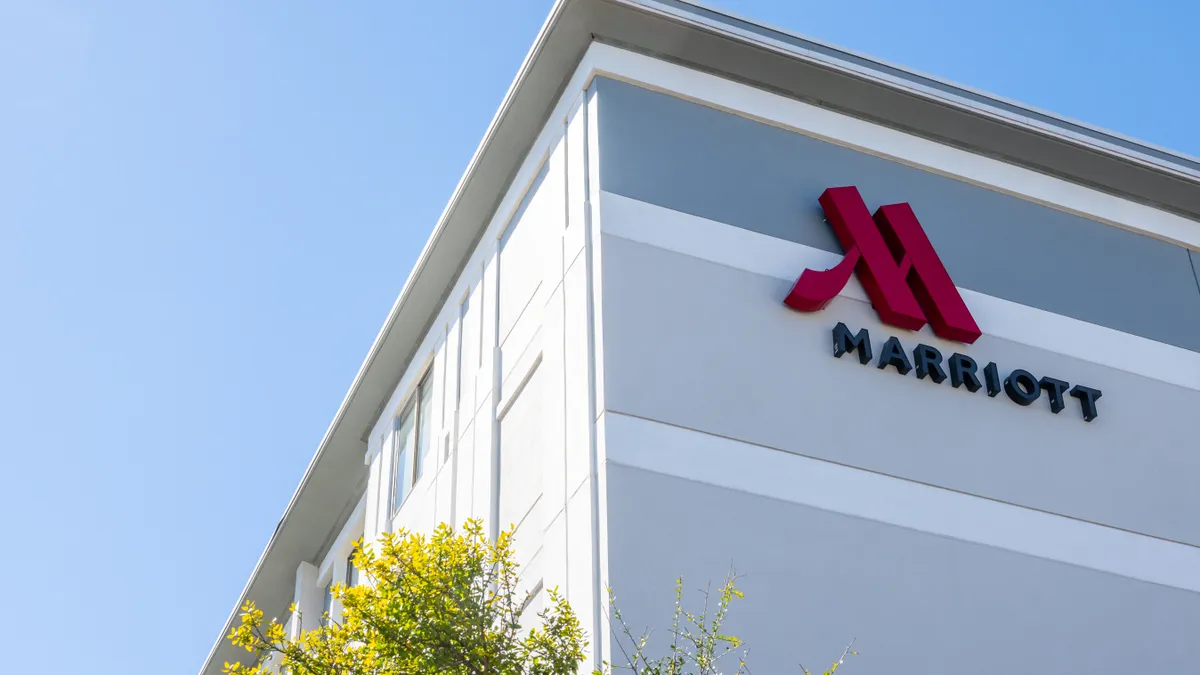Dive Brief:
- Marriott International reported 7.2% year-over-year growth in global RevPAR in the fourth quarter of 2023, with 3.3% gains in the U.S. and Canada. For full-year 2023, the company saw global RevPAR rise 15%, Marriott President and CEO Anthony Capuano said in an earnings report.
- Marriott added nearly 81,300 rooms globally during 2023, with net rooms for the full year up 4.7% year over year, according to Capuano. The company’s development pipeline also reached a new high of 3,400 properties, or roughly 573,000 rooms, up approximately 5% and 3%, respectively, quarter over quarter.
- Marriott expects to see continued growth in 2024, particularly in the midscale segment, according to Capuano, who touted a new U.S. transient midscale brand during the company’s Tuesday earnings call. Future growth will be bolstered by “solid demand for travel,” Capuano noted.
Dive Insight:
Following significant portfolio growth in 2023, Marriott expects continued momentum in the midscale and luxury spaces, as well as from hotel conversions, in 2024.
Capuano told analysts and investors during a Tuesday earnings call that Marriott is currently working on a new U.S. transient midscale brand for both new-build and conversion properties.
The brand would come on the heels of Marriott’s entry into the midscale segment in the U.S. and Canada in June 2023, when the company launched its StudioRes extended stay brand. In January, Marriott broke ground on the first StudioRes hotel in Fort Myers, Florida. During the call, Capuano shared there are more than 300 additional potential StudioRes deals under discussion in around 150 U.S. markets.
“The ability to get midscale deals signed, financed, shovels in the ground and open more quickly than what we've seen with a lot of other tiers in our portfolio is another factor in our enthusiasm for our entry into the tier,” Capuano said during the call.
He added that there's “a tremendous market opportunity from a demand perspective” for midscale, and Marriott’s franchise community has a strong appetite for the segment. Additionally, “the cost of developing midscale will help [Marriott’s] partners navigate what is still a challenging financing environment,” Capuano said.
As sourcing debt for new construction remains a challenge in 2024, Marriott expects to see continued growth in hotel conversions. Momentum on the conversion side is “really encouraging,” Capuano said. In 2023, conversions accounted for 25% of Marriott’s organic room additions and 40% of organic rooms signed.
Marriott is also poised to continue its strategic push in the luxury segment. The company’s luxury distribution is currently over 50% larger than its next closest competitor, Capuano said. As of September, Hyatt had the next highest share of global luxury distribution, according to Marriott.
According to Capuano, Marriott will have “another year of solid growth” in 2024, bolstered by strong travel demand.
Group demand, particularly, is pacing well and was the “standout customer segment” in Q4, Capuano said. In the quarter, Marriott’s group revenue increased 7% year over year in the U.S. Industry-wide, group travel has seen a resurgence in several major markets like Dallas and New York City in recent months, driving increased hotel profits.










